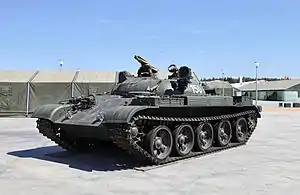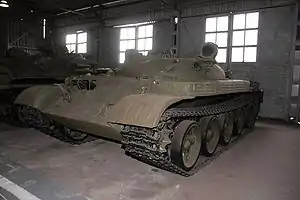IT-1
The IT-1 (Russian: Истребитель танков–1 - 'Istrebitel tankov–1', lit. 'tank destroyer-1') was a Soviet cold war missile tank based on the hull of the T-62. The tank fired specially designed 3M7 Drakon missiles from a pop-up launcher. It saw a very limited service between 1968 and 1970. The large deadzone around the tank created by the missiles' minimum range combined with the limited amount of ammunition carried made it unpopular with the military. Also, the 520 kg of guidance equipment needed for the missile was impractical. Eventually, the tanks were converted into recovery vehicles. A turbine-powered version was also developed named the IT-1T.
| IT-1 | |
|---|---|
 | |
| Type | Tank destroyer |
| Place of origin | Soviet Union |
| Service history | |
| In service | 1968-1973 |
| Used by | Soviet Union |
| Production history | |
| Designer | A.E. Nudelman |
| Manufacturer | Uralvagonzavod |
| No. built | 220 |
| Specifications | |
| Mass | 34.5 t (38.0 short tons; 34.0 long tons) |
| Length | 6.63 m (21 ft 9 in) |
| Width | 3.30 m (10 ft 10 in) |
| Height | 2.20 m (7 ft 3 in) |
| Crew | 3 (commander, driver, gunner) |
| Armor | Cast turret 220 mm at 73 ° turret front 165 mm turret sides 30 to 58 mm turret roof 65 mm turret rear 102 mm at 30° hull front 16 to 30 mm hull roof 20 mm hull floor 80 mm at 90° hull sides |
Main armament | 2K4 Missile launcher (recharge of 15 3M7 Drakon anti-tank missiles) |
Secondary armament | 7.62 mm PKT coaxial general-purpose machine gun (2000 rounds) |
| Engine | V-55 12-cylinder 4-stroke one-chamber 38.88 liter water-cooled diesel 581 hp (433 kW) at 2,000 rpm |
| Power/weight | 14.5 hp/tonne (10.8 kW/tonne) |
| Suspension | torsion bar |
Operational range | 391 km (243 mi) on road (650 km (400 mi) with two 200 l (53 US gal; 44 imp gal) extra fuel tanks) |
| Maximum speed | 50 km/h (31 mph) (road) 35 km/h (22 mph) (cross country) |

Development
Tests were conducted in April 1964 using two prototype IT-1 tanks. In 1964, there were 94 test firings. Until the end of 1964 they produced 94 controlled launchings of "Drakon". In 1968 the vehicle was put into limited production, which continued until 1970.
Description
The IT-1 had a crew of three, a driver, gunner and commander. It was armed with a pop-up missile launcher fitted into a low profile turret along with a 7.62 mm PKT machine gun with 2000 rounds of ammunition. Twelve 3M7 Drakon missiles were stored in an automatic loader and a further three were stored in an unarmoured box on the back of the turret. Every missile was stored in a storage container in the shape of a long rectangular box. Upon loading of a new missile, a hatch would open on the roof of the turret, with the missile being raised out of the turret by the autoloader. The storage container of the missile would then be jettisoned, allowing the 3M7 Drakon to extend its stabiliser fins, readying the weapon to be fired.
The missile was radio-command guided, using any one of seven frequencies and two codes. That prevented vehicles within a single unit interfering with each other. It was launched slightly upward, and at an angle to offset any wind drift during the first second of unguided flight. A tracer on the rear of the missile allowed the guidance system to track the missile and transmit radio commands to the missile. The commands were decoded by the missile and translated into deflection of the missiles fins. To ensure night combat capability, night-vision equipment was provided, but substantially reduced the missile's range.
Specifications (3M7 Drakon missile)
- Guidance: Radio SACLOS.
- Weight: 54 kg
- Warhead: 5.8 kg
- Diameter: 180 mm
- Wing span: 860mm
- Length: 1240mm
- Range:
- 300 m to 3300 m (day)
- 400 m to 600 m (night)
- Speed: 217 m/s
- Penetration: 250 mm versus RHA at 60 degrees
See also
- Taifun, a prototype Russian missile tank system developed during the same period.
External links
- Article about rocket tanks (in Russian)
- Article about the T-62 (in Russian)